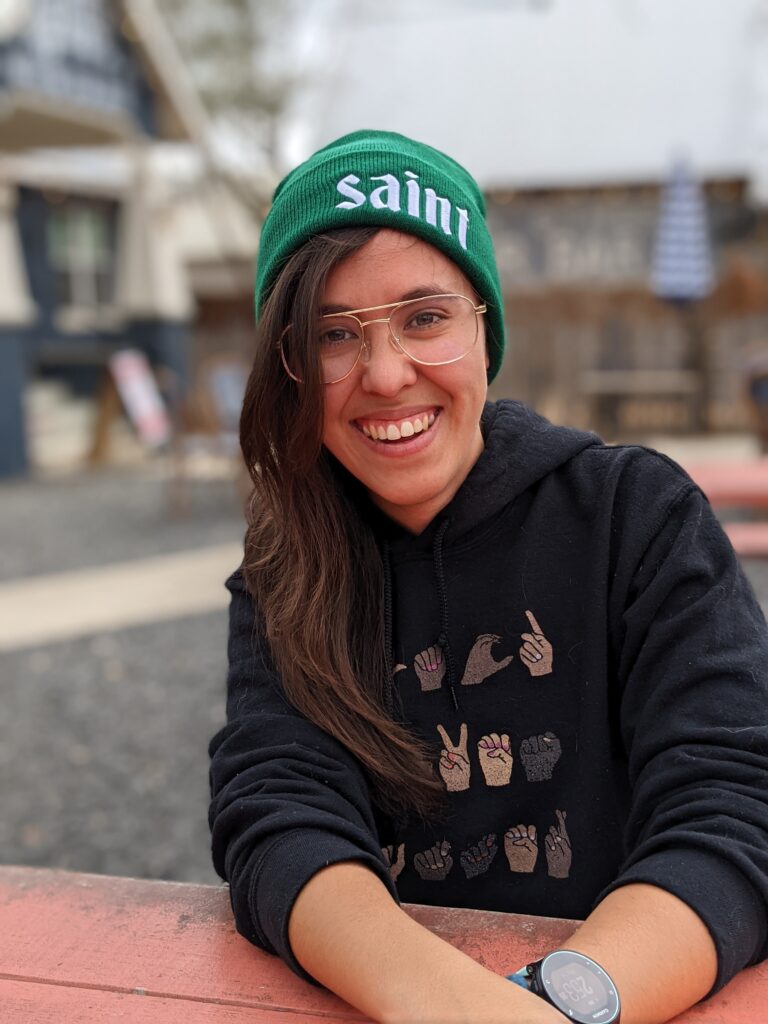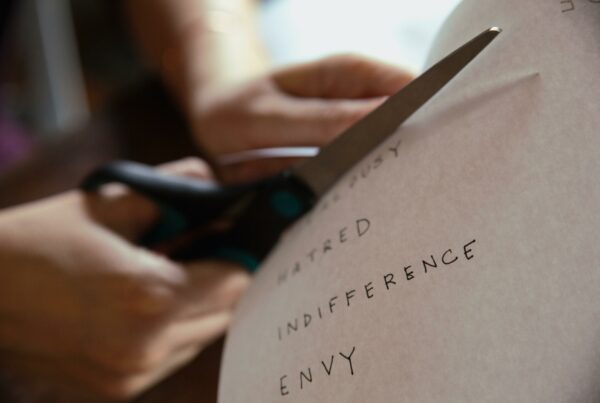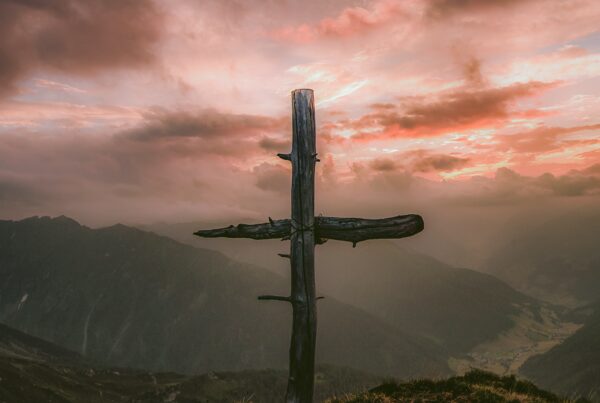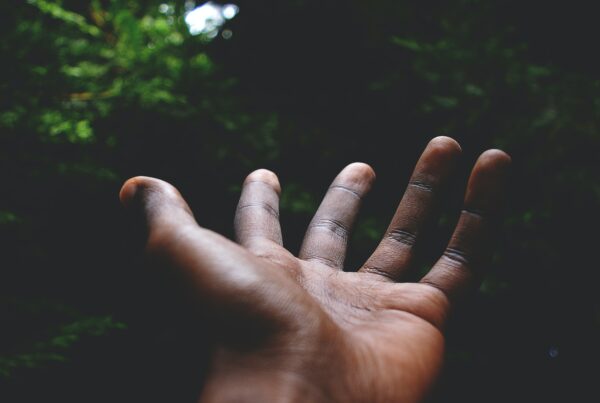Leading up to this season of Lent, I have been absolutely fixated on the image found in Psalm 23 in the valley of the shadow of death: Darkness. Pain. Trauma. In the middle of a space where our instinct tells us to just grin and bear it, our Lord prepares not just any table, but a feasting table. I can’t help but be both struck and amused by the irony of entering into a time of fasting this year being comforted by the image of a feast.
However, it’s this image which has had me wondering less about what I’m fasting from, and more about for whom I’m fasting. Even if you’re not fasting from food for Lent this year, the experience of fasting from something that disrupts your daily life should point you to your very real need to be sustained not by your own efforts but by the provision of our Lord. What if we fasted to experience our true inability to sustain ourselves, and used that felt need to drive us to an even fuller experience of all that Jesus invites us into?
Our Western, American culture values a “suck it up, get on with it,” hyper-individualistic mentality as opposed to communal healing and growth. The Asian American community specifically has been in an ongoing state of hyper-grieving for the past two years as anti-Asian hate and violence has continued to rise. Even as I write this, it is not lost on me that the anniversary of the Atlanta Spa Shootings is the day that this article will be released. A tragedy that caused a deep, felt wound that shocked its way through the entirety of the Asian American community. A tragedy that I carry in my neck, my shoulders, my gut, and in my very existence as a mixed, Vietnamese/White twenty-six-year-old woman.
To me, the wonder I find in the image of a feasting table in the middle of chaos comes from the seeming contradictions at play. Jesus doesn’t invite his people to rush through the darkest valley, the pain, or the chaos; he invites us to stop and sit in the middle of it with him. All of us. At his communal table. He doesn’t tell us to wait until we’re no longer afraid or hurting to find rest at his table; he provides sustenance in the middle of the chaos. I am walking through this season of Lent feeling both an embodied sense of grieving and lament with my AAPI brothers and sisters across the country. Yet, I also find an even more rooted sense of strength, hope, and a sober minded joy in knowing that I do not grieve alone. My own lament and pain is echoed by my brothers and sisters across the country as we all strive to help each other turn to Jesus in our sorrow and pain.
In John 6:35, Jesus makes a strange declaration: “’I am the bread of life,’ Jesus told them. ‘No one who comes to me will ever be hungry, and no one who believes in me will ever be thirsty again.'” Today, it’s easy to gloss over the language and miss the weirdly gruesome, even carnal image that Jesus paints for the crowd following him at the time. He made this statement knowing full well that those listening to his words would have been attempting to reconcile the seemingly two different ideas of Jesus’ physical body and the sustenance of bread. The beauty of Lent is that it is a time for the entire Body to collectively look forward to the celebration of Jesus’ resurrection: which is the source of both an eternal and daily sustenance for those who believe in him.
The hope I have been experiencing during Lent this year has not been found through gritting my teeth through the fasting part in order to get to the celebration of the resurrection. The hope of Lent for me has been found in the waiting, in the fasting, in the embodied experience of my own need. The act of fasting shouldn’t be so focused on whatever is being given up; fasting as one Body and one Family should be a communal experience that points us to the very real hope that Jesus’ physical, embodied resurrection brings. I experience feasting on Christ through the act of physical fasting as my own body highlights my need for Jesus on the daily, and I see that same need echoed across the Family of God in the lives of my brothers and sisters as we all strive toward the embodied hope of the resurrection together.
Our Lord really took on flesh, drew near to us, and allowed himself to be degraded and humiliated to the point of being made a spectacle in his murder. Lent is an opportunity to reclaim an idea that many of us reject: we are helpless. Whether that means asking our neighbor for an extra tablespoon of butter, or acknowledging that the miraculous breath in our lungs every day isn’t something we consciously choose to do. We can only maintain the facade for so long that we are self-sustaining creatures before we burn ourselves out. Fasting during Lent serves as a communal and physical experience as we, the Body of Christ, anticipate and strive toward the celebration of the source of our embodied hope: Jesus’ physical, embodied resurrection.
I invite us all to reclaim the discipline of fasting this year. Not as something we do to have an “undistracted,” limited period of time of considering Christ. Not to glorify ourselves in our sacrifice. Instead, we can fast as a way of experiencing in our bodies the embodied hope of Christ through his daily provision as we collectively look forward to the hope of the resurrection.
Where we lack, he provides abundance. Where our bodies are weak, he provides strength and endurance. Where our bodies fail, we know with certainty that we will experience a physical resurrection, where the hope of Christ is no longer a yearning but eternal, abundant sustenance. It’s in this anticipation for hope fulfilled where I find strength at the table which is prepared in the middle of pain. I find encouragement from my brothers and sisters sitting with me at the table, seeking refuge. It’s in this strange picture of pain and provision where I experience feasting in the fasting.

Katie Nguyen is a mixed Vietnamese/White pastor, writer, and teacher in Austin, currently completing an M.A. in Christian Leadership at DTS, and engaging in the work to care for the historically unseen and marginalized in the city of Austin. She also consumes books like they’re chips, can often be found by the nearest body of water, and loves a good cup of coffee and conversation.
Our lent blog series celebrates the life, death, and resurrection of our liberator. We enter the forty days understanding that it is one of solidarity. Chasing Justice will be guiding our community through the lent with Instagram posts for sharing with friends and guest blogs by BIPOC authors.
The views and opinions expressed on the Chasing Justice Blog are those of the authors and do not necessarily reflect the official policy or position of Chasing Justice. Any content provided by our bloggers or authors are of their opinion and are not intended to malign any religion, ethnic group, club, organization, company, individual or anyone or anything.








